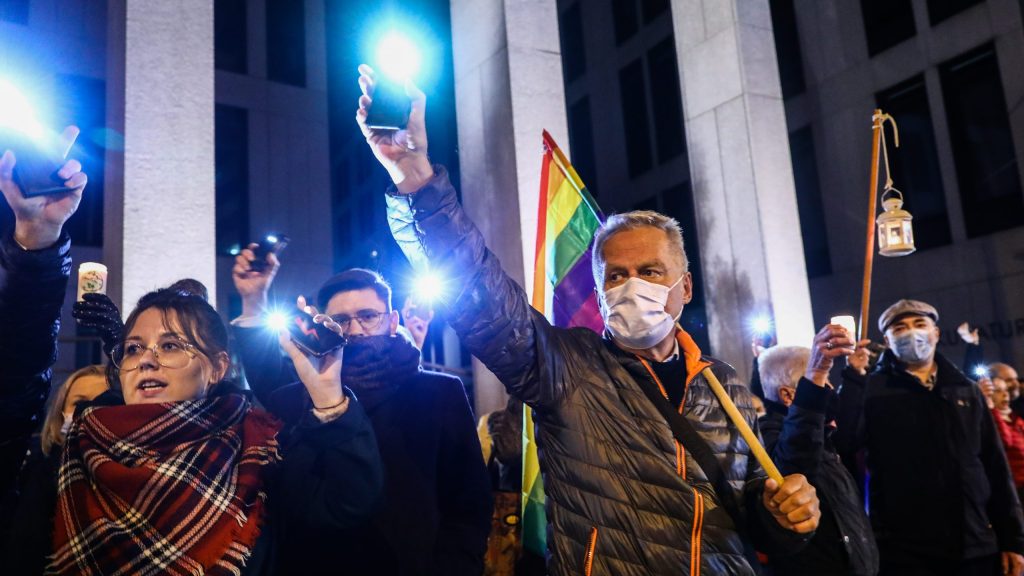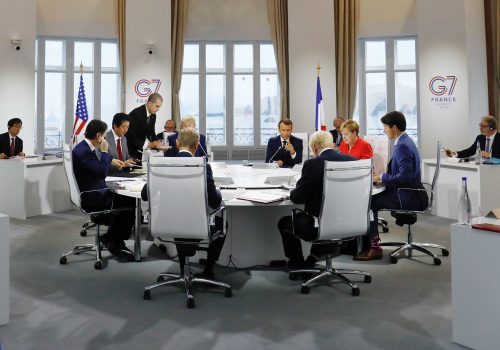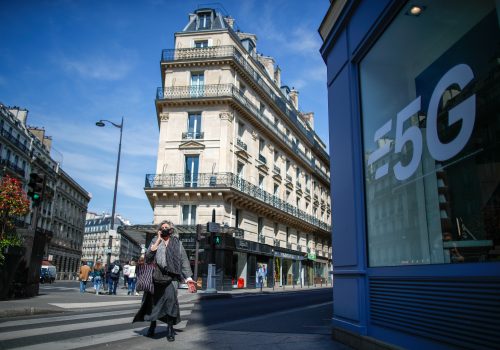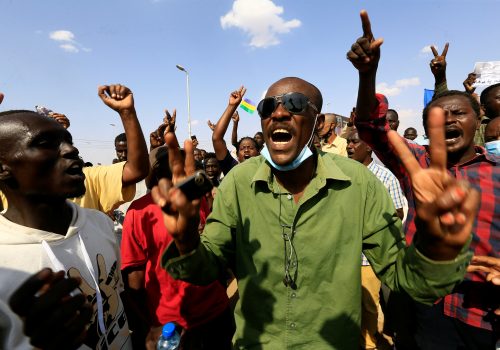Key takeaways:
-
Two of the Council’s democracy experts say the Biden administration’s upcoming Summit for Democracy needs to take aim at autocrats’ tools by focusing on anti-corruption and tech standards.
-
Don’t obsess over which governments are invited, they say—but focus on commitments to action and the showcasing of civil society and democracy activists from countries whose governments are invited (like the Philippines) and not (like Russia).
-
Mean it: Follow through with commitments from governments and corporations, and help organize democracies (and all the stakeholders they include) to monitor them.
Support for democracy is a conceptual centerpiece of US President Joe Biden’s foreign-policy strategy, and his administration has put this in grand terms. Consider the statement he issued after meeting Ukrainian President Volodymyr Zelenskyy in September: “Ukraine’s success is central to the global struggle between democracy and autocracy.” Much is packed into that sentence: that US interests can be defined in terms of democratic values, that the struggle between those values and autocracy is global, and that US interests in a particular country can be judged in that broad context.
Biden is far from the first US leader to feature democracy so prominently in their foreign-policy agenda. Since President Franklin Roosevelt and British Prime Minister Winston Churchill signed the Atlantic Charter in 1941, support for democracy as the foundation of a rules-based international order has run through US foreign-policy thinking as the answer to challenges ranging from communism to fascism, terrorism, violent extremism, and ethno-nationalism. Although the United States has been inconsistent—and sometimes even hypocritical—in its support for democracy globally, presidents of both parties keep coming back to it. For a time, democracy, and the universal rights on which it is built, seemed ascendant.
But we are in a moment of profound democratic decline around the world. Whether in Uganda, Turkey, the Philippines, Brazil, parts of Europe, and even here in the United States, democratic governments struggle to deliver while authoritarian leaders capitalize on frustrated and polarized populations.
This democratic retreat is not happening in isolation. Leaders like Chinese President Xi Jinping and Russian President Vladimir Putin harbor other visions of the international order: Instead of democracy, they seek to make the world safe for autocracy. Putin wants a fractured world he can manipulate. But while he aims to burn order to the ground, Xi and his Chinese Communist Party (CCP) are advancing a new sort of rules-based international order in which economic integration and prosperity can coexist with centralized political control (and the brutal repression it requires). Whether it’s Russian-rooted corruption intertwining itself into the US and British financial systems or the CCP’s techno-authoritarianism baked into the apps, networks, and devices used by billions of people around the world, the struggle between democracy and dictatorship is systemic—and it requires collective action.
This is why Biden’s emphasis on democracy is not merely ritual incantation, but contested policy ground both internationally and in the United States.
His administration has chosen the virtual Summit for Democracy, set for December 8-10 (with a planned in-person follow-up one year later), as a symbolic centerpiece for its strategy. It’s a good idea: By rallying democracies against the autocrats’ conviction that their time has come again, the summit could reaffirm the basics of democracy and supplement them with principles better suited to twenty-first century challenges, such as emerging technologies. It can also reset the conversation on democracy itself from a sometimes boisterous declaration of perfection to an honest grappling with the process as a mechanism for advancing the general welfare—as the US Constitution describes it—through inevitably imperfect means.
But the Biden team has probably already discovered that it’s hard to translate even good ideas into practical policies, and the Summit for Democracy is no exception. Off the bat, there are two foundational questions the White House must answer:
What does the summit do? A big declaration of democratic principles has merit. But as the only “deliverable,” it might be dismissed as unconnected to the actual challenges that democracies face. Are there also specific issues the summit should tackle that might reinvigorate ownership of basic democracy? Outside of the broad categories the administration has identified, are there core themes and issues at the root of such democratic challenges that the summit could address?
What happens after? A stand-alone summit risks being shelved and forgotten if it’s not connected to follow-up work, integrated into diplomacy, and carried forward through the necessary political will. But can the summit establish a process, or even post-summit structures, without overly bureaucratizing itself? And who gets to set the agenda, decide what success looks like, and determine which ideas are worth investing in? Whose lives are different at the end of this?
Based on our conversations with summit planners, foreign officials, and civil-society leaders, the conceptual planning appears solid, but the crunch points for delivery are fast approaching. Here’s how this potentially landmark event is shaping up so far—and how we believe it should end up.
Lay of the land
Invitations have gone out to 108 countries (109 if we include the United States), inevitably including some more democratic than others, and some with authoritarian leaders at their helm. Although their inclusion may seem awkward, focusing on leaders such as Brazilian President Jair Bolsonaro, Filipino President Rodrigo Duterte, or even Indian Prime Minister Narendra Modi risks narrowing the conversation to one about individuals rather than systems.
The question of invitations also depends on an understanding of which activists and civil-society representatives are invited and elevated on a world stage—considering that only governments have been invited so far. Certainly, the brave activists pushing for their rights in Russia should be invited, even while President Putin is left off the list. Likewise, platforming Filipino or Brazilian democracy activists to speak on behalf of their countries could send a powerful message about what this Summit for Democracy is about.
The United States has cast a wide net for official participation. Excluding the most clearly authoritarian countries, it has taken a commitments-based, rather than a conditions-based, approach; it has asked interested national governments to self-generate pro-democracy initiatives or reforms. These will be rolled out at the summit and carried through the ensuing “year of action.” Countries will be expected to arrive at the second summit in December 2022 with progress updates and new deliverables. The Biden administration’s approach contains echoes of the old Helsinki process (from the Conference on Security and Cooperation in Europe) of the mid-1970s that involved getting undemocratic leaders to make human-rights commitments for which they could later be held to account.
That’s a clever device, because it’s more workable than trying to define which governments do and do not meet some pre-set (and inevitably subjective) democratic norms. Rather than set itself as judge of democratic standards, the Biden administration has allowed for a degree of self-selection by interested governments, with recognition that democracies have flaws and face challenges. At the same time, ensuring that civil society has meaningful input into national pledges and is able to push countries to commit to new and sometimes difficult things—not just offering up existing programs as a path to entry—are important challenges with which the administration must contend.
Finally, the two-part summit structure also finesses the invitation issue by allowing time to assess the credibility of a country’s pledges, and even adjust future invitations to include countries in transition.
In the 2020 Foreign Affairs piece in which then presidential candidate Biden announced his intention to hold the Summit for Democracy, he said the event must “include civil society organizations from around the world that stand on the frontlines in defense of democracy.” He also noted the importance of addressing the private sector’s role (including technology companies) in “preserving democratic societies.”
The first summit’s virtual nature temporarily defers the difficulty of choosing from the thousands of brave and important civil-society leaders and organizations worthy of such a platform. But getting civil society onstage, setting the agenda, and driving action will be essential.
Perhaps even more complicated will be deciding which private companies (particularly technology firms) will make the cut. Including industry in the difficult conversations required on the impact of technology on democracy is essential. But ensuring the summit doesn’t become a mere photo opportunity without meaningful action will require careful calibration from the administration and allied nations.
We gather that the administration is planning to include tracks for subnational governments (mayors and governors) that are leading local democracy innovations and could drive progress—a wise move given undemocratic trends at the national level in some countries. The United States also plans to include a track for legislators from participating countries. A broad, rather than leader-focused, approach reflects the pluralistic and complex web that makes a democratic nation and take some pressure off the impossible expectations of a perfect head of state invite list.
For its part as the summit host, the United States must also seriously address its own shortcomings to provide credibility for the entire enterprise. Keeping the vote-counting and certification process free from partisan manipulation is a critical and current challenge—as is addressing the long legacy of voter suppression based on race. Failing to ensure free and fair elections at home is not a good look for a country that constantly trumpets their importance abroad. But those issues, in addition to the thorny challenges of police abuse and access to justice, aren’t solvable by the executive branch alone. Congress and the states have an outsized impact on the viability of such reforms.
Finally, any substantive declaration or charter should probably await the in-person summit in 2022 to provide space for a truly consultative process that reaches beyond governments. It should combine reaffirmation of democratic basics (such as free elections, free media, and respect for the rule of law and human rights) while addressing current thinking about democratic challenges and the responsibilities of democratic states and non-state actors. The Atlantic Council attempted this in 2019 when it convened a high-level global group to produce a Declaration of Principles. It was an effort to bring together classical liberal and contemporary progressive thinking into a coherent framework and captured signatures from all continents and both sides of the US partisan divide.
A similar declaration could reflect the hard work of the “year of action” through which governments, civil society, and others can highlight the most important challenges requiring collective action, as well as hard-fought points of agreement to drive them forward.
Setting a substantive agenda
The administration has laid out three substantive pillars for the summit, including “addressing and fighting corruption,” “defending against authoritarianism,” and “advancing respect for human rights.” While these broad themes appear intended to leave space for governments, activists, and civil-society actors to drive an agenda, it has led to some confusion about which issues the Biden administration cares about and where particular lines of effort should sit. For instance, where do issues related to technology and society belong? What about police abuse or prison reform?
It’s also clear that the White House believes tackling corruption is an essential element of reinvigorating democracy, and we expect its commitments to be more focused there than in other issue areas. Before joining the Biden administration, National Security Advisor Jake Sullivan and senior National Security Council official Rebecca Brocato called on Congress to stem the flow of “dirty money” into the United States. Seeing such issues under the spotlight now is no surprise—and this is a good thing. A global push on anti-corruption measures, targeting problems such as beneficial ownership for corporations, is logical, but the summit also provides an opportunity to expand that discussion into additional areas, such as those identified by Josh Rudolph in Foreign Policy or Julia Friedlander and Anders Åslund in an Atlantic Council report.
We also expect the United States to focus its efforts at the summit on free and independent media, ensuring fair democratic elections, supporting front-line activists and democratic champions, and addressing technology’s impact on and role in democratic societies. While other nations may choose to focus on other issue areas, the United States has the unique ability to drive multilateral initiatives and pooled funding commitments, meaning that its chosen initiatives are likely to include and drive action from others.
Similarly concrete and pointed commitments may emerge to enhance human-rights standards, with economic punishments for violations. This could look like other nations adopting versions of the United States’ Russia-specific Magnitsky Act and the subsequent Global Magnitsky Act, or even creating a broader mechanism for coordinated, multilateral sanctions. With the US Commerce Department’s recent blacklisting of NSO Group—which had provided spyware to foreign governments—there is opportunity for international action to limit the spread of other such pernicious and antidemocratic surveillance technologies as well.
The trouble with tech
One issue that is existential to the trajectory of democracy is the impact of technology on societies. While the Biden administration and many of its democratic partners recognize this issue as important, it seems less clearly fleshed out for collective action at the summit.
Particularly tricky is that the internet—along with much of the digital technologies that run on it—is systemic, meaning the decisions of one country or company can have an outsize influence on all, for good or ill. And as with universal rights, the power for good is in the collective approach: The more that buy in, the better. But as more authoritarian countries demand data localization, the employment of local workers, and criminal liability for companies, firms are being increasingly pulled toward the bottom of “democratic” standards.
At the same time, while autocrats continue to censor online content, spy on their citizens, and restrict the free flow of information, democratic governments also struggle with ensuring that offline rights are extended to the online world, as well as mitigating the danger of radicalizing content via social-media companies—which plays into autocrats’ hands.
These issues, difficult and complicated as they may be, are central to defending democracy in the twenty-first century. The summit can help establish or reinforce democratic norms and standards by seeking buy-in from companies and input from democracy activists. Autocracies will loudly dismiss them, but such norms may give tech companies incentive to resist pressure from autocracies to enable repression. And norms adopted by democracies, even informally, may also serve as templates for more formal global standards, isolating the autocracies and their own tech firms that seek to capture global market share.
The moment is right for democracies to step into this space. Awareness of the general challenge of communications technology is broad, but the work is diffuse. The United States and European Union have just begun work on some of these issues under the recently launched Trade and Technology Council that came out of Biden’s June trip to Europe. The summit can work in this space in parallel, pulling in more nations and stakeholders—with input from civil society and industry. And its inevitably more democratically principled conclusions can help inform work in other regulatory fora.
In that vein, one of the most important contributions governments can make is to organize themselves around this work. That’s why the State Department’s recent announcement of a new Cyberspace and Digital Policy Bureau is an important one, and may provide the necessary capacity to help drive forward a proactive agenda globally, and in the years after this summit specifically.
What success looks like
A serious summit should include the following: invitations to governments based on pledges, which can help avoid a food fight about who merits them; invitations to problematic leaders mitigated by platforming democratic activists from both those countries and uninvited ones (such as Myanmar); and an agenda that focuses on cutting-edge and meaty challenges to democracy (such as corruption, authoritarian tech, and inequality), sets clear goals, and demands follow-up work.
The latter need not fall to the summit alone. The event could set parameters and principles, obtain pledges from companies, and refer action and questions to other entities, such as the US-EU Trade and Technology Council, the Group of Seven (G7), the Financial Action Task Force, the Freedom Online Coalition, the Organization for Economic Cooperation and Development, and regional bodies such as the Organization of American States or the African Union. But officials could alternatively decide to set up post-summit working groups and initiatives to define standards or monitor compliance. And it can certainly be an opportunity for increased funding to civil society and journalists, as well as a doubling down on commitments for the world’s democracies to speak and act collectively.
At the same time, no credible conversation on democracy can exclude the struggles with which democratic countries are grappling themselves. Any commitments, actions, and initiatives must connect domestic and foreign policy—something that is notoriously difficult for all democracies to implement across disconnected bureaucratic structures, and even harder to drive politically.
That’s why setting a substantive and meaningful agenda is essential. In some cases, simply having difficult conversations about difficult issues will be enough, while on other matters, recommending specific actions will be essential. An Australian diplomat recently told us that a summit addressing visceral issues will have a better chance of generating momentum and global interest at this critical time. As an example, he pointed to the worldwide protests against police brutality in reaction to the murder of George Floyd in the United States: “We should be asking ourselves what is causing the democratic decline and make those issues our focus.” We agree with his assessment.
Making summits work is always a challenge for policy practitioners. It’s especially acute when dealing with a new process.
The experience of the Community of Democracies, launched in 2000 at a high point of democratic self-confidence, represents a cautionary tale. The brainchild of US Secretary of State Madeleine Albright and Polish Foreign Minister Bronislaw Geremek (a leading labor activist), this coalition was launched with high-level US support and features its own structures and principles. But today, it punches below its weight. Similar things can be said of the Freedom Online Coalition or any other number of well-intentioned but languishing multilateral and multi-stakeholder efforts—leading to waning buy-in from civil society.
On the other hand, the Helsinki Final Act of 1975, and subsequent Helsinki process, was skeptically greeted at first for including the Soviet Union, among other criticisms. But it boosted emerging dissident movements in the Soviet Union and Soviet-dominated Europe that embraced its declaratory principles, especially on human rights. Civil society and dissidents carried the Helsinki process forward in powerful ways.
It’s difficult to predict what will work at a particular moment in history. Anyone declaring certainty of the inherent wisdom or foolishness of this endeavor is probably over-stating their case. Still, the summit represents an opportunity at an urgent moment that we would be wise not to squander. It can, as Albright has already put it, be an occasion for the renewal of democracies’ vows to one another. But it should do more: Bring together democracies to address, at an operational level, the very real and urgent challenges we must face together.
Democracies have allowed their autocratic adversaries to gain the initiative in exploiting the international system. It’s time to push back.
Daniel Fried is the Weiser Family distinguished fellow at the Atlantic Council and former National Security Council senior director, ambassador to Poland, and assistant Secretary of State for Europe.
Rose Jackson is the director of the Democracy & Tech Initiative at the Atlantic Council’s Digital Forensic Research Lab. She’s also a former chief of staff to the Bureau of Democracy, Human Rights, and Labor at the State Department; foreign-policy advisor to US Senator Chris Coons; and co-founder and CEO of civic tech company Beacon.
Further reading
Tue, Jun 8, 2021
From the G7 to a D-10: Strengthening democratic cooperation for today’s challenges
Report By Ash Jain, Matthew Kroenig
With the rules-based democratic order under threat, leading democracies need to develop common strategic approaches that pool their collective influence to confront today’s challenges.
Tue, Jul 13, 2021
Rallying the world’s democracies with ‘trusted connectivity’
New Atlanticist By
As a framework for investments in global infrastructure by democratic nations, the concept of ‘trusted connectivity’ can serve as a counterweight to efforts like China’s Belt and Road Initiative.
Fri, Oct 29, 2021
Sudan’s coup wasn’t a failure of US diplomacy. It was the dawn of a new era in Africa.
New Atlanticist By
In a context where Washington’s voice is diluted amid competing powers vying for influence in Africa, Sudan has emerged as the ultimate battleground.
Image: People attend a protest in support of judical independence in Krakow, Poland, on October 29, 2021. Photo by Beata Zawrzel/NurPhoto/REUTERS



